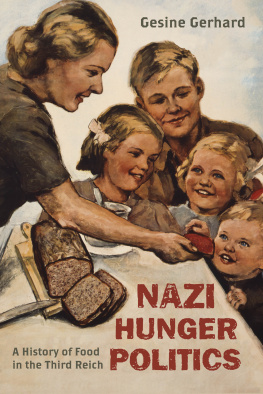First published in 1986
This edition first published in 2015
by Routledge
2 Park Square, Milton Park, Abingdon, Oxon, OX14 4RN
and by Routledge
711 Third Avenue, New York, NY 10017
Routledge is an imprint of the Taylor & Francis Group, an informa business
1986 German Historical Institute
All rights reserved. No part of this book may be reprinted or reproduced or utilised in any form or by any electronic, mechanical, or other means, now known or hereafter invented, including photocopying and recording, or in any information storage or retrieval system, without permission in writing from the publishers.
Trademark notice: Product or corporate names may be trademarks or registered trademarks, and are used only for identification and explanation without intent to infringe.
British Library Cataloguing in Publication Data
A catalogue record for this book is available from the British Library
ISBN: 978-1-138-79664-5 (Set)
eISBN: 978-1-315-75774-2 (Set)
ISBN: 978-1-138-80142-4 (Volume 4)
eISBN: 978-1-315-75497-0 (Volume 4)
Publishers Note
The publisher has gone to great lengths to ensure the quality of this reprint but points out that some imperfections in the original copies may be apparent.
Disclaimer
The publisher has made every effort to trace copyright holders and would welcome correspondence from those they have been unable to trace.
THE POLICIES OF GENOCIDE
Jews and Soviet Prisoners of War in Nazi Germany
Edited by
Gerhard Hirschfeld
With an Introduction by
Wolfgang J. Mommsen
German Historical Institute, 1986
This book is copyright under the Berne Convention.
No reproduction without permission. All rights reserved.
Allen & Unwin (Publishers) Ltd,
40 Museum Street, London WC1A 1LU, UK
Allen & Unwin (Publishers) Ltd,
Park Lane, Hemel Hempstead, Herts HP2 4TE, UK
Allen & Unwin, Inc.,
8 Winchester Place, Winchester, Mass. 01890, USA
Allen & Unwin (Australia) Ltd,
8 Napier Street, North Sydney, NSW 2060, Australia
First published in 1986
British Library Cataloguing in Publication Data
The Policies of genocide: Jews and Soviet prisoners of war in Nazi Germany.
1. World War, 19391945 Prisoners and prisons, German I. Hirschfeld, Gerhard
940.531503924 D805.G3
ISBN 0049430459
ISBN 0049430467 Pbk
Library of Congress Cataloging-in-Publication Data
Main entry under title:
The Policies of genocide.
Bibliography: p.
Includes index.
1. Holocaust, Jewish (19391945) Addresses, essays, lectures. 2. World War, 19391945 Prisoners and prisons, German Addresses, essays, lectures. 3. Prisoners of war Soviet Union Addresses, essays, lectures. 4. Prisoners of war Germany Addresses, essays, lectures. 5. Germany. Heer History World War, 19391945 Addresses, essays, lectures.
I. Hirschfeld, Gerhard, 1946
D810.J4P618 1986 940.547243 8531567
ISBN 0049430459 (alk. paper)
Set in 10 on 11 point Bembo by Computape (Pickering) Ltd and printed in Great Britain by Billing and Son Ltd, London and Worcester
Jrgen Frster, D. Phil., is with the Militrgeschichtliches Forschungsamt in Freiburg/Breisgau. He has published widely on the history of the Second World War (for example, Stalingrad. Risse im Bndnis 1942/43, 1975) and is one of the authors of Der Angriff auf die Sowjetunion (1983), vol. 4 of Das Deutsche Reich und der Zweite Weltkrieg.
Gerhard Hirschfeld, D. Phil., is a Fellow of the German Historical Institute in London. He is the author of Fremdherrschaft und Kollaboration. Die Niederlande unter deutscher Besatzung 19401945 (1984) and has edited (among others) Exile in Great Britain. Refugees from Hitlers Germany (1984).
Lothar Kettenacker, D. Phil., is a Fellow and Deputy Director of the German Historical Institute in London. He has published (among others) Nationalsozialistische Volkstumspolitik im Elsa (1973) and is editor (with Gerhard Hirschfeld) of The Fhrer-State: Myth and Reality (1981). A study on British planning for post-war Germany 19391945 will appear shortly.
Hans Mommsen, D. Phil., is Professor of Modern History at the Ruhr-University Bochum. His numerous publications on the history of the Third Reich include Beamtentum im Dritten Reich (1966) and The German Resistance to Hitler (1970). A major study about Das Ende des deutschen Wegs, 19181945, vol. 8 of Propylen Geschichte Deutschlands, is forthcoming.
Falk Pingel, D. Phil., former lecturer at the University of Bielefeld, is now with the Georg-Eckert-Institut fr internationale Schulbuchforschung in Brunswick. His publications include Hftlinge unter SS-Herrschaft. Widerstand, Selbstbehauptung und Vernichtung im Konzentrationslager (1978).
Christian Streit, D. Phil., is a teacher at a Grammar School in Mannheim. He is the author of the much-acclaimed book Keine Kameraden. Die Wehrmacht und die sowjetischen Kriegsgefangenen, 19411945 (1978).
WOLFGANG J. MOMMSEN
Over the past few years the German Historical Institute in London has arranged a series of seminars devoted to the policies of genocide and the conduct of the war in Eastern Europe after 1941, including the desperate plight of Russian prisoners of war in German hands. The following essays derive from papers given on these occasions. They deal with one of the darkest chapters of German history the systematic killing of 5 million Jews and the death of more than 3 million Soviet prisoners of war in German captivity. Even now, forty years after these frightful events were made public to the world, it is extremely difficult to understand how atrocities of such magnitude could ever have occurred, even given a totalitarian regime such as the National Socialist dictatorship and the extreme conditions of the Second World War.
It is still difficult to discuss these issues with the objectivity and impartiality of scholarly research. But approaching these events with intellectual honesty is the only way to confront them and to help prevent anything similar ever happening again. Contrary to some currents of public opinion in the Federal Republic of Germany and elsewhere, which would sometimes prefer to pass over them in silence, we believe that the facts must be faced squarely. On the other hand, it is necessary to go beyond moral indignation and investigate the objective causes that made human beings, who were otherwise quite ordinary, not to say civilized, actively take part in these policies. Historians must, therefore, not only look into the ideological and political issues, but also take into account the social, socio-psychological and institutional factors that made this genocide possible.











